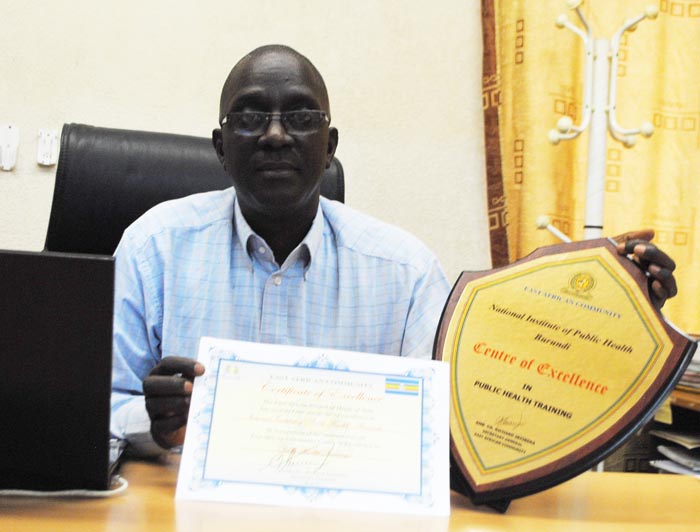The National Institute of Public Health has recently been chosen in Public Health Training as a centre of excellence during the 15th EAC Summit of Heads of States on 30 November 2013 at Kampala.-By Diane Uwimana

Dr Pierre Claver Kazihise: “The Institute will focus on biomedical analysis and look for other research to improve the health quality of Burundians and foreigners.” ©Iwacu
Three institutes (Burundi Agricultural scientific Institute ‘ISABU’ from the Ministry of Agriculture and Livestock, Hope Africa University from the Ministry of Higher Education and Scientific Research and the National Institute of Public Health ‘INSP’ from the Ministry of Public Health) presented their applications for the centres of excellence in the Community during the second phase of evaluation. The first assessment occurred in 2011 while there wasn’t any institute from Burundi which submitted its application.
Dr Pierre Claver Kazihise, Director General of INSP indicates that the judges looked into many things: “the vision, mission of the institute, governance, institute management, performance or competence, teaching quality, learning and production resources, twinning and collaboration with other institutions.”
Five (one from each partner State) judges composed the appraisal team and three from the national level. “Each institute was assessed and got marks according to its performance. INSP got 85% that is the reason why the commission of assessors proclaimed our Institute as centre of excellence because we scored very good marks (over 8O%),” points out Dr Kazihise.
“EAC Centres of Excellence will be supported”
The National Institute of Public Health is among other EAC Public Health Institutes awarded during the 15 EAC Summit of Heads of State held in Uganda.
“Today, we are allowed to use the EAC symbols in our documents,” underlines the Director General of INSP. He also states that all the awarded centres of excellence will receive a support to boost the education and training sector. “We are going to develop our teaching following modern technologies, improve research , build new infrastructure to allow our stakeholders’ accessibility in improving our laboratory and scanner”, points out Dr Kazihise. Moreover, he notices that the quality control will gain the field. “The Institute will focus on biomedical analysis and carry out other research to improve the health quality of Burundians and foreigners,” adds Kazihise.
In conclusion, Dr Kazihise mentions that the Institute will improve the quality of training in the community.














 IWACU Open Data
IWACU Open Data

